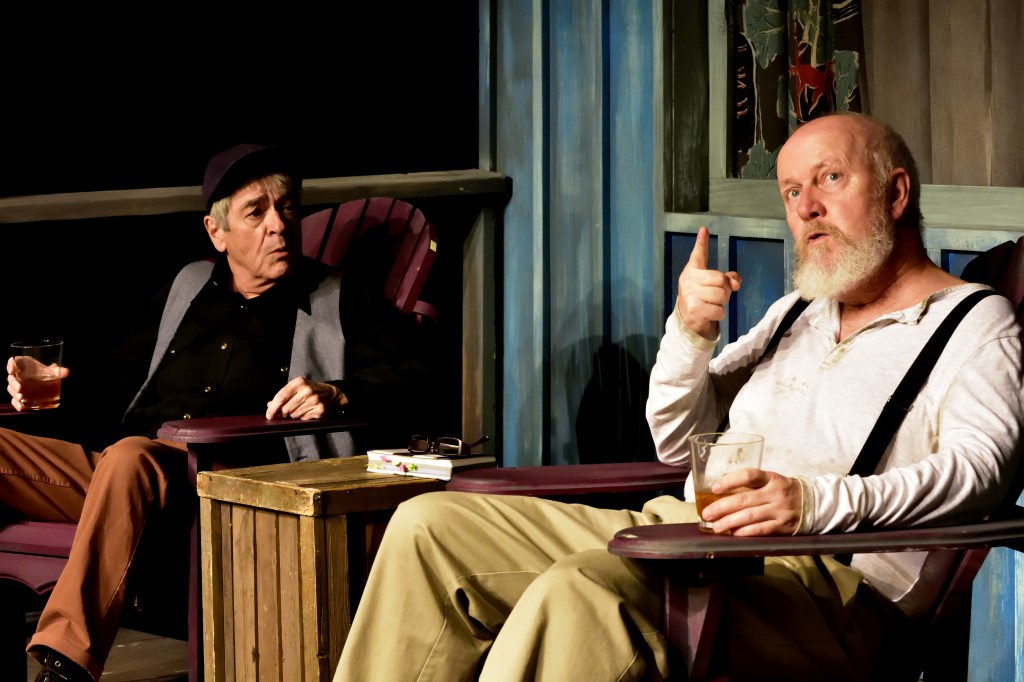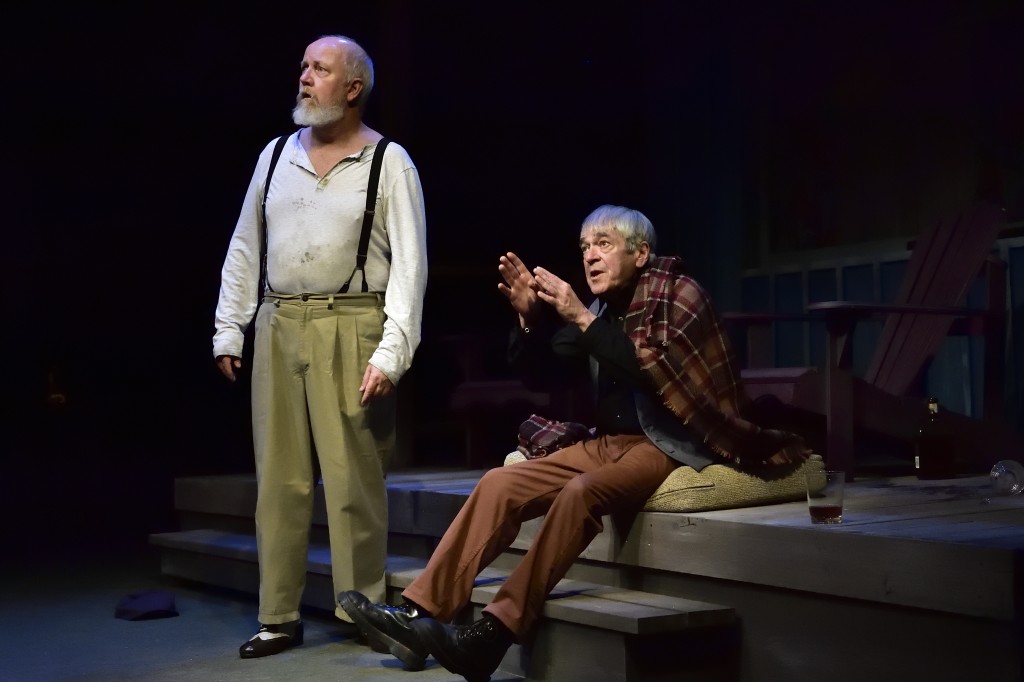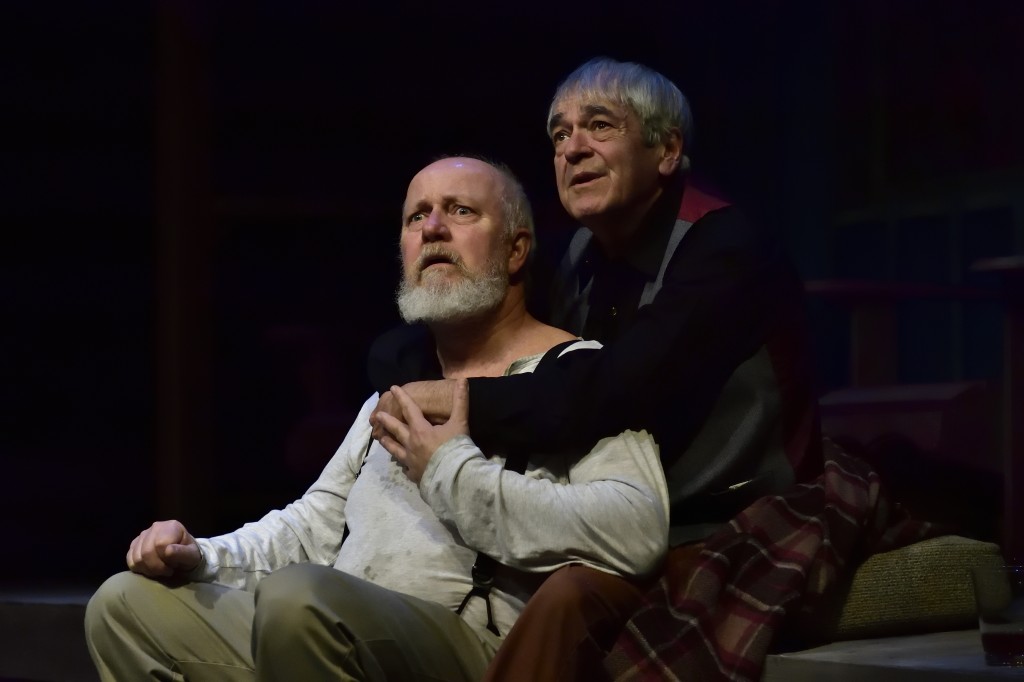
Credit: Chris van der Schyf
Posted October 31, 2016
On the surface, Ages of the Moon, produced by Lonesome Moon Productions with the support of Presentation House Theatre, doesn’t take many risks; there’s no gender-bending or colour-blind casting. No bells and whistles. As Presentation House artistic director Kim Selody cheerfully and unabashedly told us on opening night, the play is about two old white guys (Ames and Byron), designed by a white guy (Ted Roberts), directed by a white guy (John Cooper) and written by a white guy (Sam Shepard).
Risk-taking, bells and whistles be damned: sitting in a darkened theatre watching two pros (Alec Willows and Jon Bryden), go at Sam Shepard’s script is to find yourself under the spell of one of America’s best, most celebrated playwrights.
After the curtain fell on opening night, memories of all the other Shepard productions came flooding back to a lobby full of, well, a lot of old white guys and women: Lie of the Mind (Main Street Theatre Equity, 2010), True West (with brothers Gerry Mackay and Peter Mackay in 2003), Fool For Love (Andy Rhodes as Eddy) and way back in the 80s, the much-lamented Westcoast Actors Society’s unforgettable production of Buried Child.
Ages of the Moon was commissioned in 2009 by Dublin’s Abbey Theatre for actors Stephen Rea and Sean McGinley; later, in 2010, the play enjoyed an off-Broadway run with the same cast. It’s an eighty-minute, two-hander one-act that, at times, is so reminiscent of Beckett’s Waiting For Godot, it almost seems like plagiarism: “Where are you going?” “I don’t know.” “There’s nowhere to go.” Or: “Something’s come apart.” But it’s much more ruefully funny than Waiting for Godot and, in places, quietly and poetically sad. It speaks of a present day Didi and Gogo, a through-thick-and-thin friendship and more than that, of enduring love and the pain suffered when it’s squandered or death takes the loved one.

Credit: Chris van der Schyf
Willows and Bryden have been around the block and back although in this production, Bryden returns to the stage after a twenty-year hiatus. I suppose that’s risky after all these years but his chops are all still there. The physical pairing is terrific: Willows, dark and wizened as a walnut in too-short trousers and baseball cap; Bryden, white-bearded and full-faced in grubby long johns and trousers held up by suspenders.
Byron (Willows) and Ames (Bryden) have been friends for almost fifty years and despite the fact they haven’t seen each for a long time, they slip right back into the pecking order of their younger selves: Byron is low status, Ames calls the shots.
After a desperate, possibly suicidal Ames makes a middle of the night phone call summoning Byron to a little cabin in the woods where he’s holed up, they sit drinking bourbon, arguing, reminiscing, fighting and making up.
As in Beckett or Pinter, both of whom clearly inform Shepard’s work, timing is everything and Willows and Bryden absolutely nail it with long, pregnant pauses especially as Byron mulls over what Ames has just said. In describing some floozy Ames has had a fling with, Ames uses the phrase, “ . . . for even a minor blow job.” Long pause. Byron, quizzically: “Minor?” There’s not a lot of action; it’s almost always in the tension and release between these two as they consume a lot of booze.
Some critics argue that Shepard appears to have lost his edge in Ages of the Moon. I think it’s more likely he has found a different, more mature edge. Ames and Byron banter: “How much time do you have left?” “Where?”. “Where else?” “Well, where are we going?” This is Shepard who, along with the rest of us, is aging and asking, “Who is going to be there whenever and wherever we are going? Friends? Lovers? No one?”
In the gathering gloom, Byron and Ames sit on a pair of old porch chairs waiting for what is going to be a full eclipse of the moon. As a metaphor, the stage of the moon is perfect. How small we are, how easily moved into the shadows, how easily ‘eclipsed’.
Shepard lost his edge? Not on your life.

Credit: Chris van der Schyf

